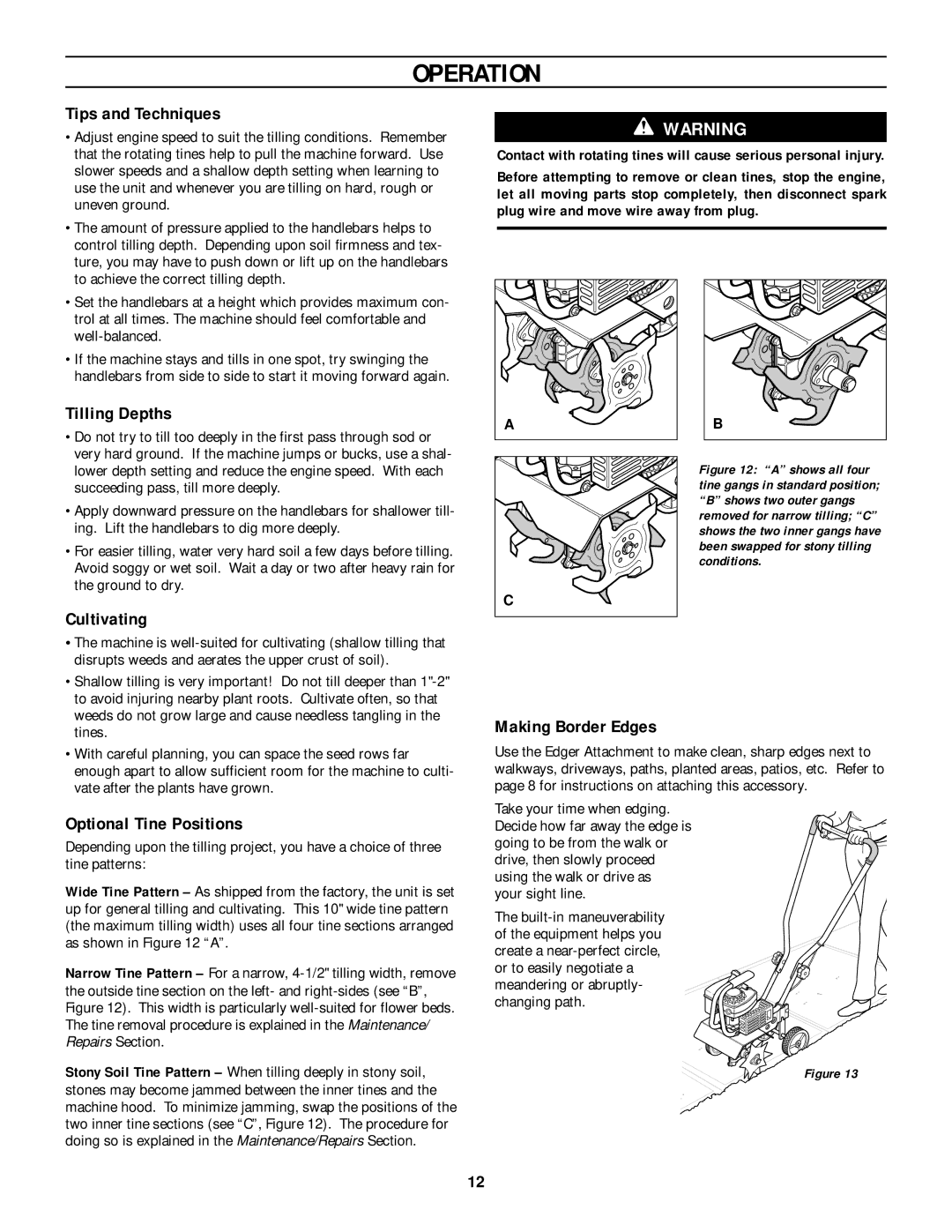
OPERATION
Tips and Techniques
• Adjust engine speed to suit the tilling conditions. Remember |
that the rotating tines help to pull the machine forward. Use |
slower speeds and a shallow depth setting when learning to |
use the unit and whenever you are tilling on hard, rough or |
uneven ground. |
• The amount of pressure applied to the handlebars helps to |
control tilling depth. Depending upon soil firmness and tex- |
ture, you may have to push down or lift up on the handlebars |
to achieve the correct tilling depth. |
WARNING
Contact with rotating tines will cause serious personal injury.
Before attempting to remove or clean tines, stop the engine, let all moving parts stop completely, then disconnect spark plug wire and move wire away from plug.
• Set the handlebars at a height which provides maximum con- |
trol at all times. The machine should feel comfortable and |
|
• If the machine stays and tills in one spot, try swinging the |
handlebars from side to side to start it moving forward again. |
Tilling Depths
•Do not try to till too deeply in the first pass through sod or very hard ground. If the machine jumps or bucks, use a shal- lower depth setting and reduce the engine speed. With each succeeding pass, till more deeply.
•Apply downward pressure on the handlebars for shallower till- ing. Lift the handlebars to dig more deeply.
•For easier tilling, water very hard soil a few days before tilling. Avoid soggy or wet soil. Wait a day or two after heavy rain for the ground to dry.
Cultivating
A |
C |
B |
Figure 12: “A” shows all four tine gangs in standard position; “B” shows two outer gangs removed for narrow tilling; “C” shows the two inner gangs have been swapped for stony tilling conditions.
•The machine is
•Shallow tilling is very important! Do not till deeper than
•With careful planning, you can space the seed rows far enough apart to allow sufficient room for the machine to culti- vate after the plants have grown.
Optional Tine Positions
Depending upon the tilling project, you have a choice of three tine patterns:
Wide Tine Pattern – As shipped from the factory, the unit is set up for general tilling and cultivating. This 10" wide tine pattern (the maximum tilling width) uses all four tine sections arranged as shown in Figure 12 “A”.
Narrow Tine Pattern – For a narrow,
Stony Soil Tine Pattern – When tilling deeply in stony soil, stones may become jammed between the inner tines and the machine hood. To minimize jamming, swap the positions of the two inner tine sections (see “C”, Figure 12). The procedure for doing so is explained in the Maintenance/Repairs Section.
Making Border Edges
Use the Edger Attachment to make clean, sharp edges next to walkways, driveways, paths, planted areas, patios, etc. Refer to page 8 for instructions on attaching this accessory.
Take your time when edging.
Decide how far away the edge is going to be from the walk or drive, then slowly proceed using the walk or drive as
your sight line.
The
Figure 13
12
